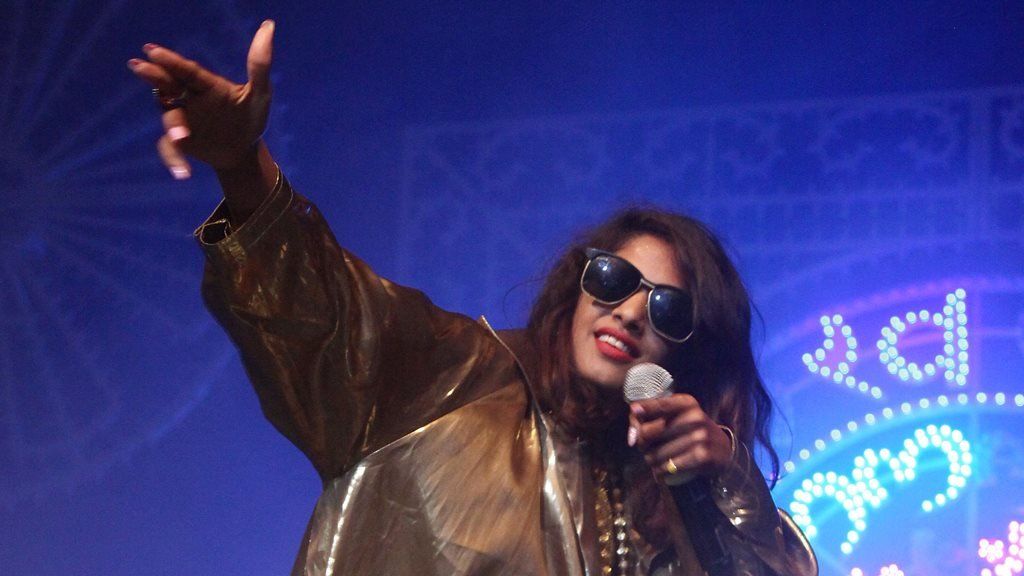Meltdown: Five times MIA challenged the status quo
- Published

One of pop's true originals, MIA, has been handed the keys to this year's Meltdown festival in London.
The musician said she would "bring together music's best forward thinkers" for the week-long event.
Although the programme is yet to be announced, it is bound to combine her revolutionary politics with a restless passion for new music.
Created in 1993, Meltdown is curated by a different cultural figure every year, from David Bowie to Yoko Ono.
MIA said she intended to showcase "different types of music which have inspired each other to exist" at London's South Bank Centre.
The singer, whose biggest hits is the Clash-sampling Paper Planes, is known for pitting hip-hop beats against world music.
Her lyrics address oppressed peoples around the world, including Tamils, Palestinians, and African-Americans.
Often outrageous, always outspoken, her songs and videos have angered the US government, Super Bowl fans, and an entire French football team.
Here are five times she stood up to the status quo.
CHALLENGING SAUDI ARABIA OVER WOMEN'S RIGHTS
The video for Bad Girls finds MIA perched atop a car as it races through the Moroccan desert on two wheels.
It was inspired by YouTube videos of "drifting culture" - a Saudi phenomenon, where daredevil drivers nonchalantly sip tea or smoke hookahs while their vehicle is tipped up on the passenger-side tires.
By putting herself in the driving seat, MIA was openly supporting the "Women to drive" movement in Saudi Arabia, which is (still) seeking to allow females the right to drive in public.
ACCUSING THE SUPER BOWL OF EXPLOITING GIRLS
When MIA appeared as Madonna's guest at the 2012 Super Bowl, she was instructed to censor a lyric during the song Give Me All Your Luvin'. She responded by raising her middle finger to the camera - and America went apoplectic.
"I literally had to make out of there like a diamond robber," she told the BBC of the aftermath. "There was so much press. I was like, 'I can't believe this, it's insane.'"
The National Football League attempted to sue her for $16 million, saying the singer broke a pre-show agreement to maintain its "reputation for wholesomeness".
MIA responded with a feisty YouTube statement, protesting that at "the precise moment in question" you could see 15 dancers behind her, all of them under 16.
"They're all wearing cheerleader outfits, hips thrusted in the air, legs wide open, in this very sexually provocative position," she said. "Is my finger offensive, or is the underage black girl with her legs wide open more offensive to the family audience?"
The dispute was eventually settled in private.
#MUSLIMLIVESMATTER
As recently as last year, the star courted controversy by appearing to criticise the Black Lives Matter movement.
Asked about the upsurge in politically-motivated music by London's Evening Standard, she said: "It's interesting that in America the problem you're allowed to talk about is Black Lives Matter. It's not a new thing to me - it's what Lauryn Hill was saying in the 1990s, or Public Enemy in the 1980s.
"Is Beyonce or Kendrick Lamar going to say Muslim Lives Matter? Or Syrian Lives Matter? Or this kid in Pakistan matters? That's a more interesting question.
"And you cannot ask it on a song that's on Apple, you cannot ask it on an American TV programme, you cannot create that tag on Twitter, Michelle Obama is not going to hump you back."
The quotes were characterised as an attack on Black Lives Matter - an accusation the star angrily denied. Nonetheless, the controversy led to her being dropped as the headliner of the Afropunk Festival in London.
HIGHLIGHTING THE PLIGHT OF REFUGEES
As a former refugee, who escaped the violent civil war in Sri Lanka to come to London as a child, MIA has written about the refugee experience since her first album, 12 years ago.
But the self-directed video for Borders was her boldest statement to date, featuring boatloads of refugees, and people desperately climbing barbed wire fences in an attempt to flee tyranny.
She said it was inspired by an aerial photograph of "1,000 people in one boat" printed by Time Magazine, which pressed home the urgency of the topic.
"We're at some sort of turning point," she said. "Society was gearing up to become more closed off than it has been."
Bizarrely, the biggest protest against the video came from the Paris Saint-Germain football team, who objected to MIA wearing a bootlegged version of the club's shirt (it read "fly pirates" rather than "fly Emirates").
An exasperated MIA said the team had missed the "bigger picture and the bigger message".
"It's gone over their head."
PREDICTING WIKILEAKS
MIA's fourth album opened with a track called The Message - riffing on the spiritual song Dem Bones, with a lyric about government surveillance.
"Headbone connects to the headphones / Headphones connect to the iPhone / iPhone connected to the internet / Connected to the Google / Connected to the government."
Back in 2010, critics derided the song as naive - but three years later, Edward Snowden leaked details of a massive global surveillance programme by the US National Security Agency.
MIA responded by posting a collage of those negative reviews on Tumblr, asking "Who said this three years ago?"
Her actions earned the praise of Wikileaks founder Julian Assange, who later helped her write lyrics on her fourth album, Matangi.
Follow us on Facebook, on Twitter @BBCNewsEnts, or on Instagram at bbcnewsents. If you have a story suggestion email entertainment.news@bbc.co.uk.
- Published29 October 2013